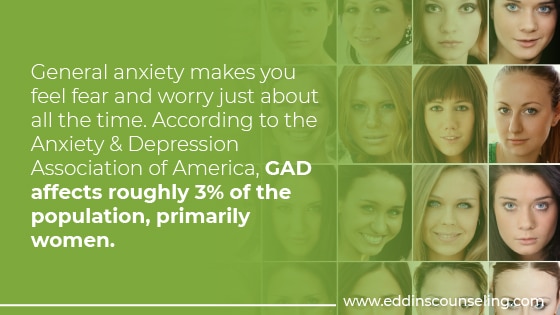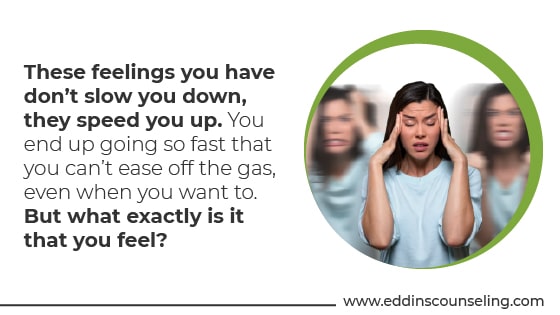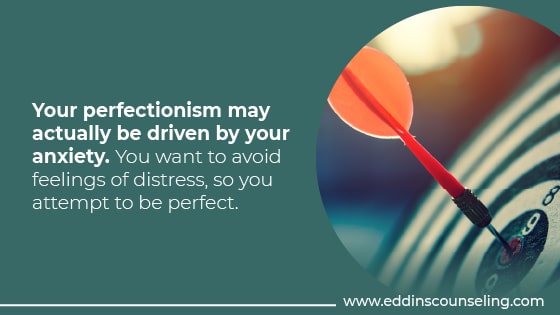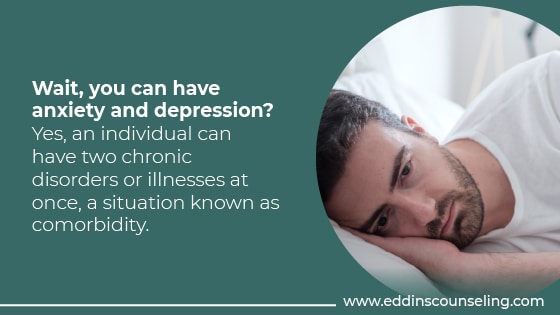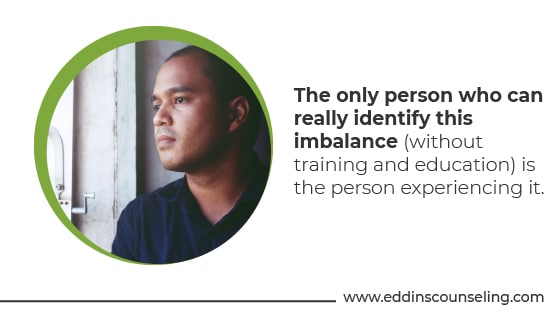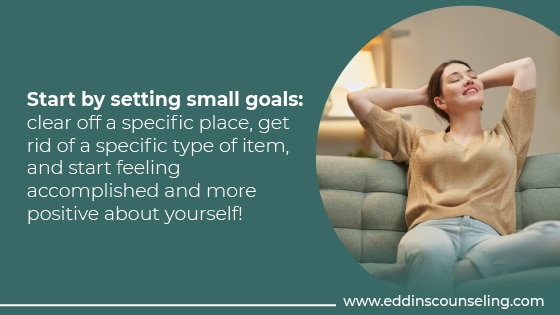November 26, 2021
7 High-Functioning Anxiety Symptoms You May Notice in Yourself
Written by Rachel Eddins
Posted in Anxiety and with tags: Overthinking, insomnia, perfectionism

High-functioning anxiety
High-functioning anxiety can take a considerable toll on your life.
When we think of anxiety, we often think of panic attacks, worry, and overwhelming thoughts that just don’t seem to stop.
Anxiety comes in many shapes and forms. However, when you experience high-functioning anxiety, it’s easy to miss the symptoms as problematic. They may be such a normal part of your lifestyle, that the symptoms might be seen as stress or insomnia.
It’s more of a drop into a bucket that no one can see.
In this post, we will explore high-functioning anxiety and discuss why it’s different from something like GAD or generalized anxiety disorder.
Table of Contents
- What is anxiety? Generalized Anxiety Disorder
- What are the symptoms of GAD?
- GAD vs. HFA
- 7 Symptoms of HFA
- Anxiety and Depression
- Risk Factors
- HFA and Depression
- Signs of HFA and Depression
- How to Cope with Co-Occurring Disorders
- Self-Help eCourses
- When you need help…
Before we get into the details of high functioning anxiety, let’s talk about generalized anxiety disorder and how that is different from a high-functioning anxiety disorder.
What does anxiety(GAD) feel like?
When a non-anxious brain worries, it might make them pause and take in those feelings. They might act more cautiously, but generally, they can carry on.
The key here is that their concern stems from a particular event or cause.
General anxiety makes you feel fear and worry just about all the time. According to the Anxiety & Depression Association of America, GAD affects roughly 3% of the population, primarily women.
You may feel the need to plan out and control situations because the uncertainty of anything feels like too much. In terms of social activities, you might find yourself reducing time spent with loved ones and friends, and withdrawing over time.
Some people even feel so distraught that they become reckless.
What are the symptoms of GAD?
Unlike high-functioning anxiety, generalized anxiety disorder is a clinical diagnosis. When people say “I have anxiety,” they actually mean that they were diagnosed with GAD.
There are several different types of anxiety disorders that can affect you, and each enters your life in its own way. GAD is the big bad umbrella of anxiety that hangs over every experience of your life.
Other types are usually triggered by specific situations and circumstances. A good example of this would be social anxiety.
Dealing with anxiety and its symptoms isn’t easy; anxiety hurts. If you recognize some of these symptoms as feelings you’ve experienced, it is okay—anxiety can get better.
The most common symptoms of anxiety include:
- Shortness of breath – Anxiety can cause you to hold your breath or breathe more rapidly. You might not notice changes in your breathing because your worries occupy your mind. Shallow or rapid breathing can actually increase your anxiety; simply monitoring your breath can sometimes help you feel a little better.
- Muscle tension – When you feel anxious, so does your body. If you’re feeling tight around the shoulders or back, or if you feel achy all over, it could be that your anxiety has your body on high alert.
- Indigestion – If you often have stomach aches or irritable bowels and diarrhea, and they tend to occur in situations that make you feel anxious, your digestive symptoms could be anxiety-related.
- Intense worry – Persistent worry about relatively normal situations is the primary psychological symptom of anxiety. In the struggle with anxiety, it sometimes feels like your worries are controlling you.
- Emotional changes – Anxiety has many emotional symptoms; you might feel irritated, on edge, or have trouble concentrating on things you used to enjoy. If anxiety is preventing you from living the life you want, it’s understandable to feel down.
- Weight fluctuation – weight gain or weight loss can be signs of anxiety. Dealing with high amounts of stress might nudge you to seek comfort from overeating, or maybe food triggers anxiety for you and you avoid it.
- Sleep disruptions – Anxiety can keep you up at night or cause you to oversleep. Maybe you have trouble falling asleep or find it difficult to stay asleep through the night. Anxiety can cause you to forfeit sleep, dreading your anxiety triggers throughout the night.
Anxiety has hundreds of symptoms, literally hundreds. It looks different depending on your personality, your circumstances, and other personal factors.
In addition to the symptoms described above, there are other, less common signs that anxiety might have an unwanted hold over your life. Anxiety can cause twitches or tremors, auditory and visual hallucinations, tingling all over your body, and feeling like you might lose control.
Chronic stress is painful, complex, and deeply affecting; the havoc it can cause in your life isn’t your fault.
Many people struggle to manage anxiety every day. If any of these symptoms sound familiar to you, talking to someone can help you sort out what you might be going through.
General Anxiety vs. High Functioning Anxiety
So, what about high-functioning anxiety? Why isn’t doesn’t it have a clinical diagnosis like GAD? What makes it different from a generalized anxiety disorder?
When you have HFA, you might feel like you have something going on in your mind, but GAD, social anxiety, and depression just don’t cut it. You don’t have those experiences.
These feelings you have don’t slow you down, they speed you up. You end up going so fast that you can’t ease off the gas, even when you want to. But what exactly is it that you feel?
We often see high-functioning anxiety translate into feelings of guilt which turns into pushing yourself too hard. GAD makes people have one of two responses to a situation, fight or flight, but someone with HFA redirects those feelings into a need for productivity and efficiency.
Symptoms High Functioning Anxiety
Because it’s not in the DSM-V, this part is a little fuzzy. You could have even more symptoms than these or just one.
Don’t worry if these aren’t a perfect match, just keep your eyes open to any feelings that could indicate something is amiss.
Common symptoms of high-functioning anxiety include:
1. Perfectionism
Do you constantly strive for perfection? Anything less is something you’d equate to failure.
Specific signs include:
- Never feeling satisfied with your work
- Always feeling like you don’t measure up
- Holding yourself to a higher standard than you hold others
- Chasing goals because of a fear of failure more than a desire to succeed
- Black-and-white (all-or-nothing) thinking
Your perfectionism may actually be driven by your anxiety. You want to avoid feelings of distress, so you attempt to be perfect.
2. Never Stopping to Rest
Do you always have a very long “to-do” list? Are you constantly moving, working on something, and overscheduling yourself?
This is a classic symptom of high functioning anxiety. Whenever things slow down, you have to face your anxious thoughts. Therefore, you don’t let things slow down.
3. Insomnia
You may find that you can’t even rest at night. If you have trouble falling asleep then it could be because anxiety is filling your mind and body.
Alternatively, you may wear yourself out enough to crash but then wake up in the middle of the night. You simply can’t rest.
4. People Think You Lack Emotion
People who live with high-functioning anxiety are often rewarded in our society. Overwork and striving for perfection are seen as good things.
However, these same people may face criticism for their seeming lack of emotion. People may describe you as:
- Cold
- Independent
- Logic-driven
- Stoic
- Unemotional
In and of themselves, these traits are neither good nor bad. However, they can be a sign of high-functioning anxiety. Usually, this is because you’re trying to hide your anxious feelings.
As a result, you hide all of your feelings. Therefore, people may find it hard to authentically connect with you.
|
|
5. Negative Self-Talk
Try an experiment for one week. Write down every single thought you have about yourself. Take a look at the list. Is it overwhelmingly negative?
If so then chances are that you could have high functioning anxiety.
This relates to perfectionism in that you have an underlying belief that if you beat yourself up then you’ll do “better.”
However, all of that negativity is really just a form of self-protection. You’re trying to be mean to yourself before others can say those things to you. You are anxious about the judgment of others.
6. Overthinking, Overanalyzing, and Second Guessing
People have to make a lot of different decisions every day. If you have high-functioning anxiety, it might look to others like you are a decisive person.
However, only you know what’s happening inside of your own mind.
Do you constantly overthink every decision? Do you make a choice and then second guess it on a regular basis? Are you prone to overanalyzing everything you say and do?
7. You Always Say Yes
Someone asks you to bake fresh cookies for your child’s event tomorrow. You say yes even though you have other things to do. Ten friends invite you to their holiday parties, and you can’t say no to any of them.
If you always say yes because you fear disappointing others then you likely have high-functioning anxiety.
Where Depression Can Join General Anxiety Disorder
Wait, you can have anxiety and depression?
Yes, an individual can have two chronic disorders or illnesses at once, a situation known as comorbidity. The interactions between the illnesses frequently impact the way one or the other affects the individual and certainly make them even more challenging to heal.
In many cases, comorbidity happens with someone who has a mental illness and a substance or behavioral addiction.
The addiction temporarily relieves symptoms of the mental illness but has long-term effects on the physical, mental health, and wellbeing of the individual, making the mental illness harder to overcome, feeding into a feedback loop.
Comorbidity can also happen with mental illnesses, which are hard to diagnose, as many indicators of one mental illness are easily mistaken for side effects or symptoms of another. It can be very hard to tell when someone suffers from both depression and an anxiety disorder, for example.
It makes sense when you think about it: the medications commonly prescribed for depression do tend to be effective for anxiety disorders as well. Non-pharmaceutical treatments that generally work well for depression also help alleviate anxiety, particularly cognitive-behavioral therapy, or CBT.
Both disorders share a similar case: the stress response system in the brain is over-reactive, causing the brain’s emotional centers to go into overtime.
This particularly affects the amygdala, the brain’s “fear center.” Have you ever had the feeling that you’re more upset than you should be by something?
This is because anxiety disorders and depression create an emotional environment.
Any outside — or inside — negative stimuli affects these response systems far more than they reasonably should. Our natural response systems are effectively “hijacked” by the disorder.
Risk factors
Some people may be more prone to developing comorbidity with anxiety and depression than others. People who suffer from social phobias or obsessive-compulsive disorder are more likely to also suffer from depression than individuals with other phobias, for example.
Family history can play a role in your susceptibility to this kind of comorbidity as does your background and age. Frequently, depression develops out of having an anxiety disorder for years.
If you suffer from an anxiety disorder for a long time without treatment and fail to learn cognitive skills to feel better or improve your mental well-being, it is very difficult to outgrow anxiety.
Conversely, if you start having panic attacks for the first time during middle age, it often indicates a history of depression.
High-Functioning Anxiety and Depression
If you can have GAD and depression, you absolutely can have high-functioning anxiety and depression.
People with HFA and depression don’t often look like they have anything wrong at all. They don’t fit the mold for either of these diagnoses.
The anxiety that they feel propels them forward, into action, but behind closed doors, their symptoms show. Their feelings of intense fatigue and guilt kick in.
They drown themselves in self-criticism and doubt and work to avoid interactions with others. No, they don’t really look like they have these issues, but often feel the effects on a deeper level that continues long-term, which is one of the reasons it’s so hard to detect.
What is interesting is that someone with high-functioning anxiety and non-high functioning anxiety will experience the same symptoms with one key difference—one works to minimize the disruptions in their life as much as possible.
You have met these people. You might even be that person. If so, people often call you a “type A” or an overachiever.
Though you’re not sure where it came from, you have always been like that. You might have even been called “anal” or a perfectionist because you can’t help but zoom in on the little details.
But underneath that perfect exterior, is an inner world filled with a lack of sleep, feelings of acute sadness, stress, self-inflicted attacks through criticism, and (more often than not) digestive issues.
Signs of High-Functioning Anxiety and Depression
As it was mentioned above, when paired with depression both GAD and HFA have a lot of the same qualities.
The only person who can really identify this imbalance (without training and education) is the person experiencing it. They will be chugging through life, but have these underlying feelings that they can’t shake.
You might cope with things like aggressive amounts of exercise or indulging in substances or overeating. Across the board, people with high functioning anxiety and depression experience the following:
- They can’t slow down or “stop and smell the roses”.
- They experience self-criticism that attacks and impacts every aspect of their life.
- They feel a great deal of guilt or worry over past or future decisions.
And though people can live with this and seem “fine”, it gets worse as time goes on and it remains untreated.
How to Cope with Co-occurring Anxiety and Depression?
Living with anxiety and depression is hard, but it doesn’t have to be so difficult. You do not have to make it on your own.
Do not be afraid to reach out for help, it is not a sign of weakness and it does not make you a less capable person. We can all use help sometimes, but it takes bravery to admit it, and courage to do something about it.
Talk to your doctor.
Be sure to mention all of your symptoms and any medicines, even vitamins, you’re talking to your health care professional so he or she can get the most accurate picture of how you are doing.
If going to the doctor makes you nervous and tend to blank out on things you wanted to bring up, carry a small notebook with you so you can write down symptoms, issues, or thoughts as they occur. This way, you have something to reference at the clinic.
Go for a walk.
Physical activity gets your endorphins flowing, helping make your brain feel good. It can be very hard to get up and go when it’s not a regular habit, but it definitely makes a difference.
It may be the boost you need to get enough confidence and energy to see a therapist and start your healing process. It’s also a good way to socialize without a lot of pressure.
You can join a walking group and start feeling more comfortable being in small groups and in low-pressure situations. You’re all there to walk and get some exercise, so there’s no pressure to chat!
Be more organized.
Living in a cluttered house doesn’t involve the mental energy of cleaning up and staying tidy. We’re all busy and if you suffer from anxiety and depression, it’s hard to summon the mental energy to clean the house.
But remember what we said about feedback loops?
A messy house makes us feel sad and disappointed in ourselves, and then we are more likely to believe the negative things our brains are trying to get us to believe. Start by setting small goals: clear off a specific place, get rid of a specific type of item, and start feeling accomplished and more positive about yourself!
Self-Help eCourses for Anxiety
There is a lot to be said for self-help. If you are worried that all this stuff could be what you are dealing with but you aren’t sure or this is definitely you and you need baby steps now, these eCourses will help you.
Try to do one lesson a week to practice the techniques they give you and built up your tolerance over time. Remember, Rome wasn’t built in a day.
Week 1: Understanding Your Anxiety
Week 2: Letting Go of the Future and the Past
Week 3: Self-Soothing and Managing Worry
Week 4: Changing Your Thoughts and Accepting Unpleasantness
Week 5: Self-Compassion: The Antidote to Perfectionism
Because you are likely a person with HFA reading this, you are probably a bit nervous to reach out for help before you try doing something on your own. I’d encourage you to not rely too heavily on these.
These eCourses will be able to assist you, but the real work happens with a professional.
Seek Treatment for High-Functioning Anxiety
It’s important to remember that because you are high-functioning it doesn’t mean that anxiety isn’t causing problems for you. Eddins Counseling Group in Houston, TX has several experienced therapists that specialize in anxiety treatment.
Please contact us by calling 832-559-2622 or booking an appointment online for therapy that can help you to identify the source of your anxiety. Furthermore, we can work together to can help you learn to manage your worries in healthier but still very productive ways.
5 Ways to Reduce Anxiety
Get instant access to your free ebook.
Grounding & Self Soothing
Get instant access to your free ebook.
Create Healthier Thoughts & Feelings
Get instant access to your free ebook.
Why You Feel This Way
Get instant access to your free ebook.

